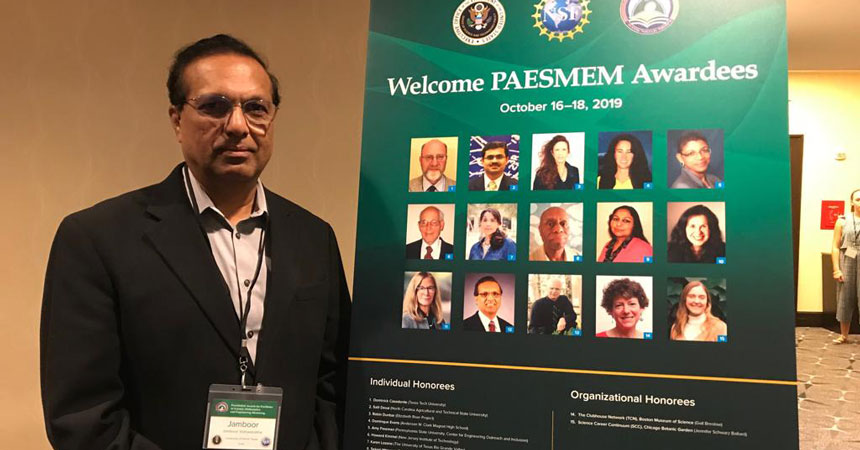Vishwanatha receives Presidential Award for mentoring work
By Jan Jarvis
Regents Professor Jamboor K. Vishwanatha, PhD, is one of three educators in the state and 15 nationwide who have been named recipients of Presidential Awards for Excellence in Science Mathematics and Engineering Mentoring.
Dr. Vishwanatha, Vice President and Principal Investigator for the National Research Mentoring Network and Director of the Texas Center for Health Disparities, will receive the award in a Washington, D.C., ceremony on Thursday.
The Presidential Award is a great honor, especially to be recognized among such excellent educators and mentors, Dr. Vishwanatha said.
“I am grateful for the opportunities I have had to make a difference in the lives of many individuals,” he said. “It is gratifying to see them as successful citizens contributing to the scientific advancement in our country. The award is a recognition of the important role of mentoring in developing and diversifying our national science workforce.”
White House officials said the award recognizes the critical role mentors play outside the traditional classroom setting in the academic and professional development of the future STEM workforce. Individual nominations are reviewed based on the impact, significance and quality of their mentoring activities. Colleagues, administrators and students nominate individuals and organizations for exemplary mentoring sustained over a minimum of five years.
Recipients receive a certificate signed by President Donald Trump and a $10,000 award from the National Science Foundation.
Charles Taylor, PharmD, Provost and Executive Vice President for Academic Affairs, praised Dr. Vishwanatha.
“This is an outstanding accomplishment by Dr. Vishawanatha, and I’m so pleased he is being recognized at the highest level for his leadership and commitment to the development of STEM.”
Dr. Vishwanatha serves as a mentor to students, postdoctoral fellows and faculty who have trained in his laboratory. He also promotes opportunities for under-represented students and faculty through various institutional, regional and national programs. Together, these activities have resulted in mentoring of more than 3,200 students and faculty.
As a faculty member, Dr. Vishwanatha has personally trained and mentored 36 undergraduate students from the partnerships he has built with minority-serving institutions.
He has personally mentored 17 graduate students, including 10 women and six individuals from other under-represented and disadvantaged groups. Of the six, two are faculty, one is working in the biotechnology industry, one is a veterinary doctor, and two are currently in PhD programs. He has personally trained 19 postdocs, five of whom are women. Eight of the postdocs have achieved faculty positions, nine are in the biotechnology industry, and two are in non-academic positions.
He is currently the principal investigator for two short-term research-training programs, a Center for Excellence in Health Disparities program, a Department of Defense-funded prostate cancer-training program for under-represented students, and a minority-based training program.
Dr. Vishwanatha said that as a mentor he feels it is of critical importance to demonstrate a strong commitment from himself and to expect the same from those he mentors. An important focus of his mentorship is to impact self-reliance in the career development of his mentees.







Social media